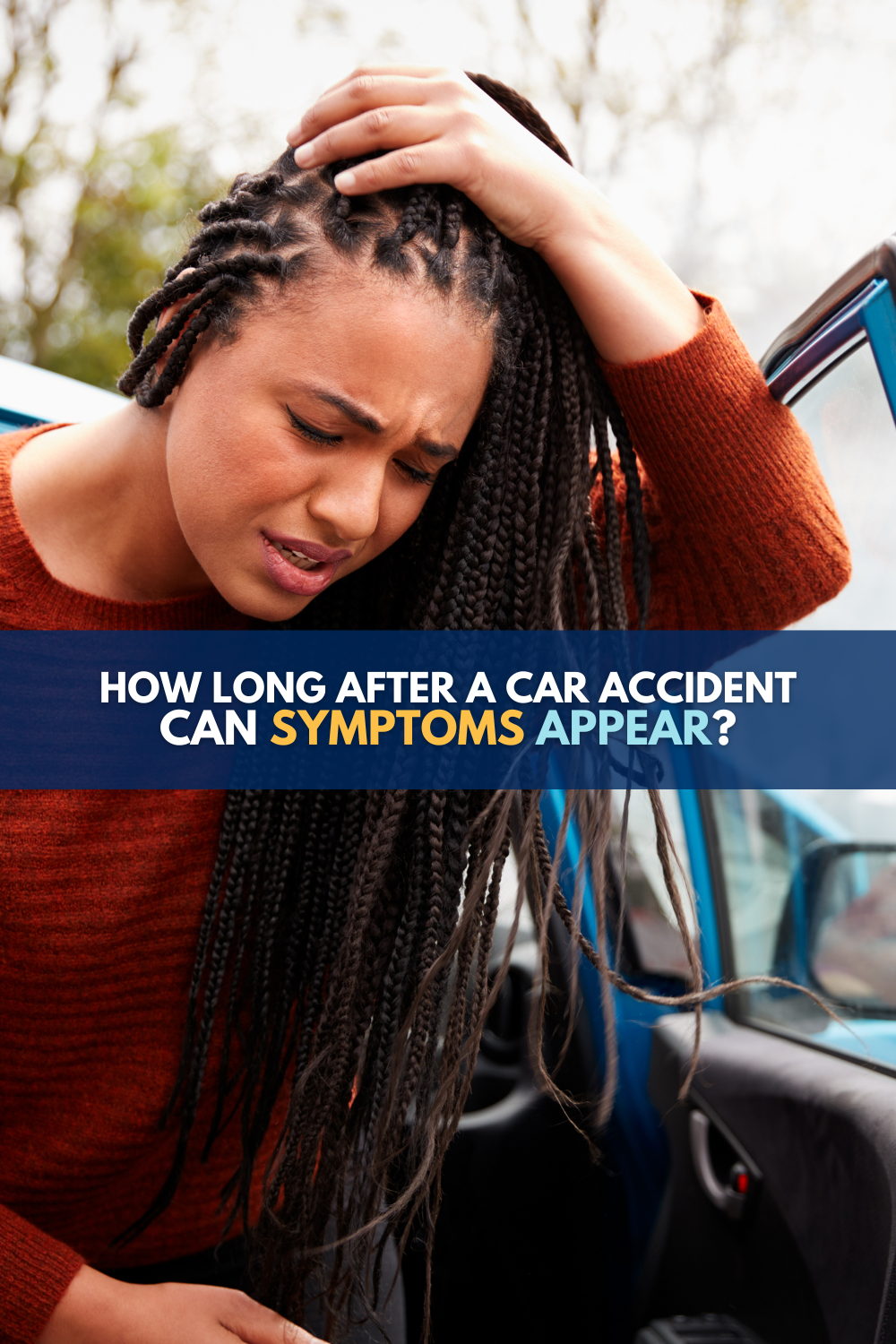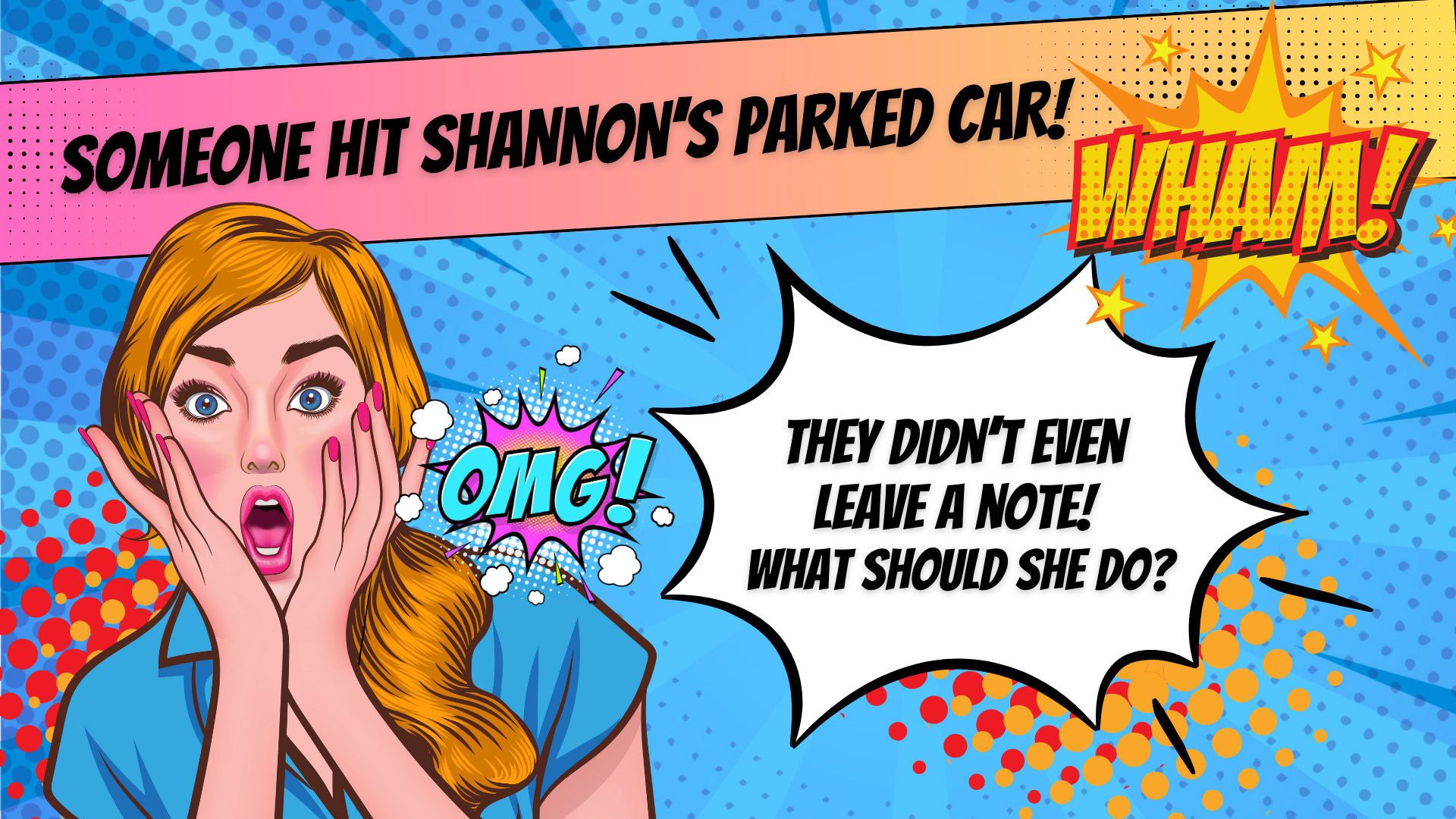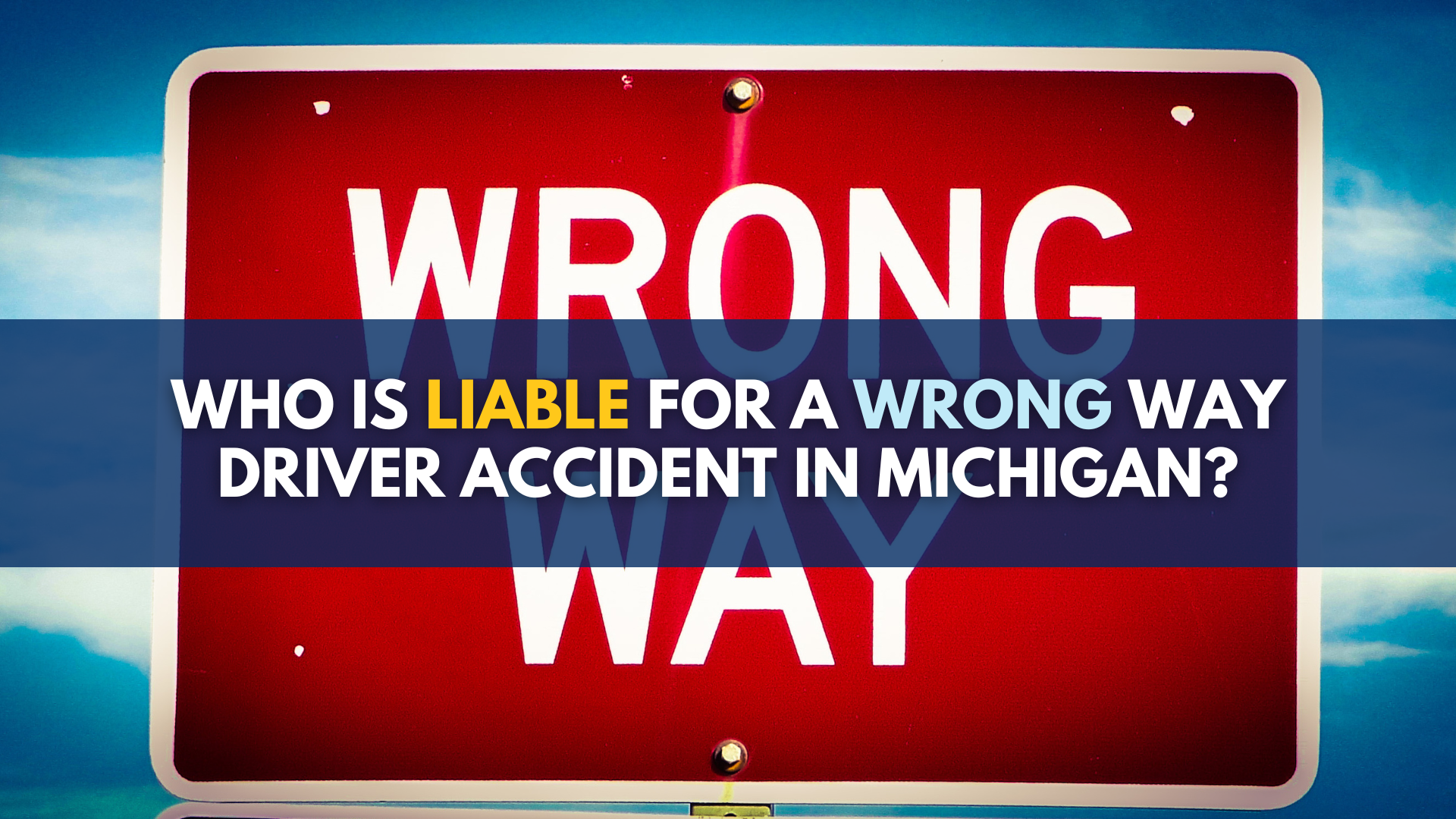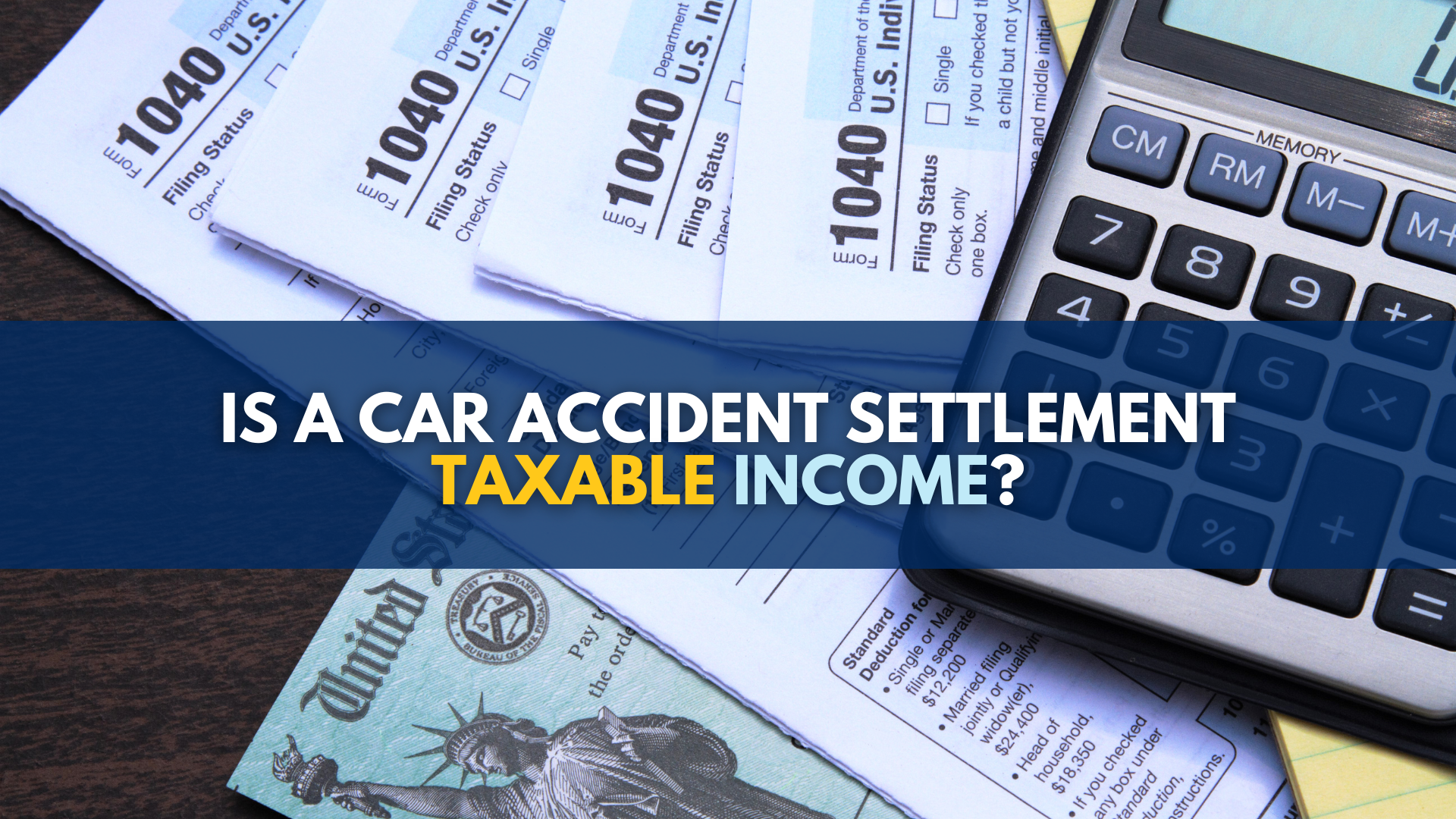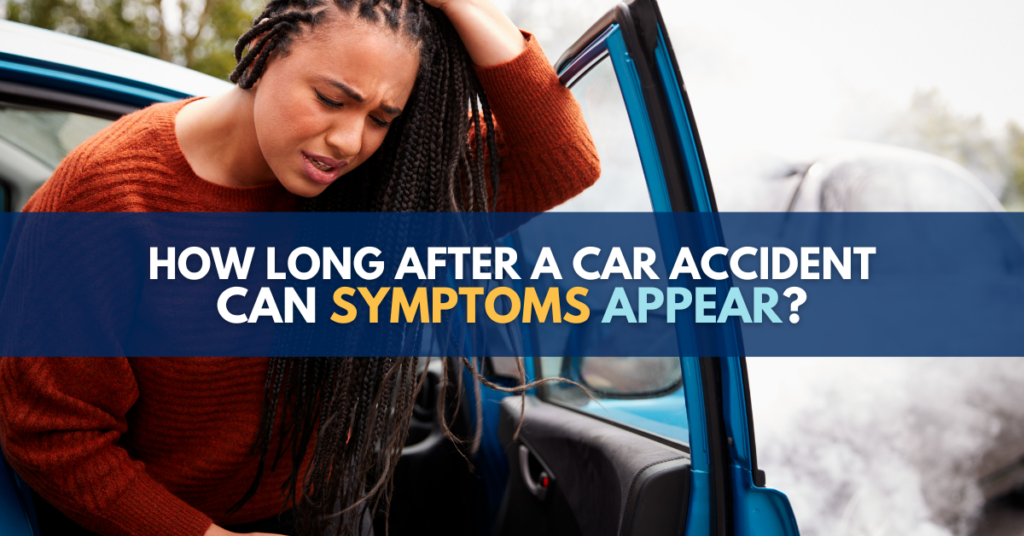
Symptoms of car accident injuries can appear immediately or delayed appearing within hours, days, weeks, or even months after a crash. The time frame often depends on the specific injury and it also varies considerably from person to person, depending on age, gender, pre-existing conditions and, in the case of traumatic brain injury, genetic predisposition as well.
Symptoms of injuries that are not noticeable right away after a car accident – and only show up in the hours, days, weeks or even months that follow – are often called delayed injury symptoms. These symptoms of pain and injury need to be taken seriously because the delayed appearance of medical symptoms can prevent an injury from being properly diagnosed and treated.
Understanding what delayed car accident injury symptoms are and the significance of delayed symptoms will help you to obtain the proper medical care and treatment you need.
It will also help when you are working with a lawyer for your motor vehicle crash who is hired to help you recover the pain and suffering compensation and money damages that you’re legally entitled to. An injury that is not properly documented, let alone treated, will not be properly and fully compensated.
If you are feeling any immediate or delayed injury symptoms after a car accident such as pain, stiffness, or discomfort, even if you feel these symptoms are mostly mild, it is still important to seek medical treatment. Make sure to properly document all the areas where you are feeling any symptoms immediately, or at least as close to the date of the crash as possible, so if these symptoms continue to worsen your insurance company cannot deny or refuse to pay for necessary medical treatment.
It is always advisable to monitor yourself closely in the days and weeks following your motor vehicle collision and to make sure to update your doctor as your symptoms worsen. Even a minor headache that begins hours after a crash could be a sign of a very serious brain injury. Stiffness in the low back or neck could be a symptom of a much more serious herniated disc that will require future surgery as the disc material continues to push out of the tear in the annulus and cause increasing pressure on the spinal cord.
What delayed injury symptoms should I beware after a car accident?
- Headaches
- Pain, stiffness, or soreness to any part of the body
- Nausea and vomiting
- Dizziness
- Feeling of disorientation or confusion
- Neck pain or back pain
- Shoulder pain or stiffness
- Back pain
- Abdominal pain
- Numbness or tingling in the limbs
- Emotional distress like depression, anxiety, or sleep disruptions
- Fatigue
- Changes in mood or behavior
- Difficulty concentrating, paying attention, or remembering information
- Inability or difficulty sleeping
- abdominal pain
A good rule of thumb is that if you are experiencing any pain, stiffness, soreness, difficulty walking or moving, headaches, or any condition that you did not normally experience before the crash, that this may be a symptom of a more serious potential injury. You should seek medical attention immediately. Do not delay.
Why don’t some injury symptoms appear right away and are delayed after a car accident?
There are generally two reasons. The first depends on the injury itself. The second depends on the individual, as not everyone’s body reacts the same.
A brain injury is a great example of both of these reasons. If you were to, for example, fracture your arm in a motor vehicle collision, that is an event that has a clear and immediate temporal relationship to the crash. It also has immediate injury symptoms, such as acute pain, that make a fracture hard to mistake or to dismiss. A brain injury is very different. A brain injury often involves a process, where for some people, mostly depending on genetic predisposition to brain injury, the injury can continue for hours, days, weeks and even months. Depending on if someone has suffered serious physical injuries or not, and whether someone is under medications that can mask symptoms, causing delays before the symptoms of a brain injury from the car accident become clear and additional weeks before someone can get into a doctor to seek treatment. There are additional factors that can affect when you notice injury symptoms after an automobile collision:
- Adrenaline release – The trauma and shock of being injured in an auto accident can cause a person’s body to release an enormous amount of adrenaline, which has the effect of masking or muting our feelings of pain, hurt, or discomfort from injuries we have suffered. As a result, the injury symptoms are delayed as we don’t become aware of the symptoms we’re experiencing after the car accident until much later – after our adrenaline has returned to its normal level.
- Nature of the injury – It is common that some injuries, such as traumatic brain injuries, concussions, damage to internal organs, sprains, and strains, will not immediately display readily identifiable symptoms. The fact that you are feeling “fine” does not mean that you are actually “fine.” In fact, there is a phenomenon known as “Talk and Die Syndrome” where a person may suffer a disabling injury or death as a result of a traumatic brain injury that went undiagnosed and untreated because the person seemed “fine” and “normal” after a experience a traumatic blow to the head.
- Mistake – Frequently, a car accident victim – and even his or her doctor – will mistake the symptom of a serious injury for a symptom of a different, less serious injury. Of course, this poses enormous risk to the crash victim because this causes a delay in diagnosis and treatment, meaning his or her injury will continue to worsen the longer it goes undiagnosed and untreated. One compelling example of this is when a headache is not just a “headache” but rather an easily overlooked symptom of a brain bleed or of a traumatic brain injury.
- Anxiety and stress – The psychological impact of being injured in an automobile crash can be very serious. Anxiety and stress can actually result in physical symptoms. This emotional distress can complicate the diagnosis of delayed symptoms and the underlying injuries.
What injuries could be associated with delayed injury symptoms after a car accident?
Injuries that could be associated with delayed symptoms after a car accident include: (1) traumatic brain injuries; (2) brain bleeds; (3) concussions; (4) spinal cord injuries; (5) damage to internal organs; (6) fractured bones; (7) sprains and strains; (8) post-concussion syndrome; and (9) post-traumatic stress disorder.
Here are some common delayed-onset symptoms and the underlying injuries they may be associated with:
- Headaches, dizziness, and memory problems – These these delayed symptoms after a crash may be symptoms of a TBI, a brain bleed, concussion or skull fracture.
- Neck and back pain and restricted range of motion – These may be symptoms of spinal cord injuries, including damage to the spinal column, fractured vertebrae and herniated disks.
- Abdominal pain, swelling and tenderness – These may be indications you have suffered damage to one or more of your internal organs, such as your liver, spleen or kidneys.
- Pain, swelling and limited mobility elsewhere on your body – These may be symptoms of sprains or strains in your muscles, ligaments or tendons.
- Anxiety or depression – These are common symptoms of emotional distress and/or post-traumatic stress disorder.
What should I do if I have delayed injury symptoms after a car accident?
If you have delayed injury symptoms after a car accident, you should seek medical attention as soon as you become aware of the symptoms. This will help ensure you are properly diagnosed and you can receive the necessary treatment from your insurance company. The longer the period of time elapses before an injury is properly documented from a crash, the more likely it is that an insurance company will dispute coverage and refuse to pay for necessary medical care and treatment.
Avoiding delays and long gaps in treatment will not only help you get better, but it will also help with your car accident lawsuit and any claim for pain and suffering compensation and money damages. Most skilled defense lawyers will defend these cases by arguing that long gaps of time between a car crash and when an injury is documented means the injuries are either faked or insignificant. The medicine and science is very clear that this is not the case, but too often juries make decisions based on emotion and psychology and most people think that any injury that is “serious” would be diagnosed and treated right away.
Medical professionals will also stress that the longer symptoms and diagnosis of injuries are delayed and go untreated after a car accident, the worse they can get, increasing the likelihood that what could have been a treatable medical injury will instead involve long-term or permanent pain, impairment, and disability.
The timeliness of reporting your delayed symptoms after a car accident is critical because by telling your doctor about them as soon as you experience them, you will make it more difficult for the insurance company or a defense lawyer to argue that your symptoms and injuries are unrelated to the crash and, thus, your claim and your compensation should be denied.
Proving an injury with delayed symptoms
The best way to prove an injury with delayed symptoms after a car accident involves: (1) seeking medical attention immediately after the crash; (2) telling your doctor about your delayed symptoms as soon as they appear; (3) continuing to treat and getting referrals to specialists and diagnostic testing to diagnose your injury; and (4) letting your doctor explain how the crash caused your injury.
The importance of properly documenting the injury in your medical records cannot be overstated. They need to reflect what your pain and symptoms are, when you first reported your injuries, what testing was done based on your symptoms, what diagnoses were made based on the testing, and the treatment that was recommended to you. This is how you get better. It is also how your lawyer can get you the full compensation you deserve if you’ve been hurt in a crash.
Can I sue if I have delayed injury symptoms after a car accident?
In Michigan, if you’re suffering from delayed injury symptoms after a car accident, you may be able to sue for compensation for the pain and suffering you have experienced as a result of your injuries. However, you have to prove the other driver was at-fault and that your injuries have affected your life.
A lawsuit for pain and suffering compensation can only be brought in Michigan if it can be proved that the driver who caused the crash was at-fault or negligent.
Additionally, under Michigan’s auto No-Fault insurance law, you must be able to prove that your injuries from the wreck have affected your general ability to live the “normal” life that you were living before the automobile accident.
Can I get No-Fault benefits if I have delayed injury symptoms?
There is no rule under Michigan law that disqualifies you from receiving No-Fault insurance benefits because the appearance of your injury symptoms were delayed after a car accident. So long as your symptoms – and your underlying injuries – are related to your crash, you’re entitled to benefits. The issue of whether or not your symptoms are related to a motor vehicle wreck or not will be a question of fact, and obviously the longer the delay or gap in time before treatment, the more likely it is that your claims adjuster will decide the injuries are not related to your automobile crash.
Injured in a crash? Call Michigan Auto Law now!
If you were injured in a car accident and are experiencing delayed injury symptoms, call now (248) 353-7575 for a free consultation with one of our experienced lawyers. There is no cost or obligation. You can also visit our contact page or use the chat feature on our website.
Michigan Auto Law is Michigan’s largest and most successful law firm that specializes exclusively in helping people who have been injured in automobile crashes.
Our secret? Our attorneys deliberately handle fewer cases than other personal injury law firms. This allows us to focus more time and attention on our cases.
Unlike other law firms, our attorneys are never too busy to promptly return phone calls and answer questions.
We have more than 2,000 5-Star reviews that reflect this care and attention to detail.
More importantly, this client-focused approach leads to better and faster settlements for our clients. Michigan Auto Law has recovered more million-dollar settlements and trial verdicts for motor vehicle crashes than any other lawyer or law firm in Michigan. We’ve also recovered the highest ever reported truck crash and car crash settlement in the state.
Call now so we can start making a real difference for you.
